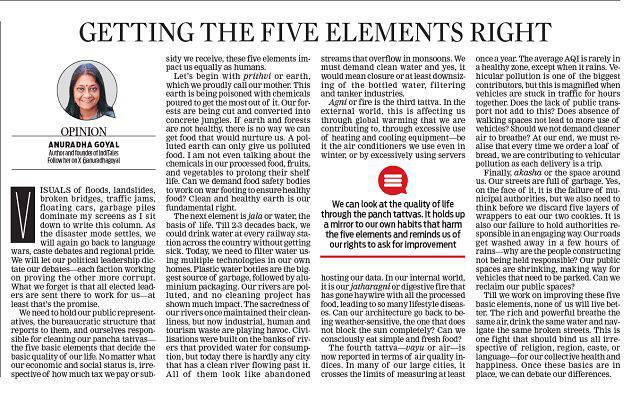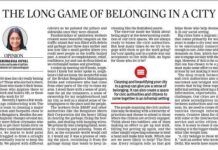The next element is jala or water, the basis of life. Till 2-3 decades back, we could drink water at every railway station across the country without getting sick. Today, we need to filter water using multiple technologies in our own homes. Plastic water bottles are the biggest source of garbage, followed by aluminium packaging. Our rivers are polluted, and no cleaning project has shown much impact. The sacredness of our rivers once maintained their cleanliness, but now industrial, human and tourism waste are playing havoc. Civilisations were built on the banks of rivers that provided water for consumption, but today there is hardly any city that has a clean river flowing past it. All of them look like abandoned streams that overflow in monsoons. We must demand
clean water and yes, it would mean closure or at least downsizing of the bottled water, filtering and tanker industries.
Agni or fire is the third tattva. In the external world, this is affecting us through global warming that we are contributing to, through excessive use of heating and cooling equipment—be it the air conditioners we use even in winter, or by excessively using servers hosting our data. In our internal world, it is our jatharagni or digestive fire that has gone haywire with all the processed food, leading to so many lifestyle diseases. Can our architecture go back to being weather-sensitive, the one that does not block the sun completely? Can we consciously eat simple and fresh food?
The fourth tattva—vayu or air—is now reported in terms of air quality indices. In many of our large cities, it crosses the limits of measuring at least once a year. The average AQI is rarely in a healthy zone, except when it rains. Vehicular pollution is one of the biggest contributors, but this is magnified when vehicles are stuck in traffic for hours together. Does the lack of public transport not add to this? Does absence of
walking spaces not lead to more use of vehicles? Should we not demand cleaner air to breathe? At our end, we must realise that every time we order a loaf of bread, we are contributing to vehicular pollution as each delivery is a trip. Can we be more mindful by minimising our contribution to traffic?
Finally, akasha or the space around us. Our streets are full of
garbage. Yes, on the face of it, it is the failure of municipal authorities, but we also need to think before we discard five layers of wrappers to eat our two cookies. It is also our failure to hold authorities responsible in an engaging way. Our roads get washed away in a few hours of rains—why are the people constructing not being held responsible? Our public spaces are shrinking, making way for vehicles that need to be parked. Can we reclaim our public spaces?
Till we work on improving these five basic elements, none of us will live better. The rich and the powerful breathe the same air, drink the same water and navigate the same broken streets. This is one fight that should bind us all, rural and urban, young and old, irrespective of religion, region, caste, or language—for our collective health and happiness. Once these basics are in place, we can debate other differences.
This is my panch tattva model for basic quality of life index. Can some smart young mathematicians or statisticians devise a mathematical formula to indicate the quality of life in our cities based on these five elements? It would help both citizens and municipalities with areas that need to be addressed on an urgent basis. Till then, let us start asking our public representatives and authorities to solve these problems on priority, while being mindful of our consumption that contributes to them.
 We need to hold our public representatives, the bureaucratic structure that reports to them, and ourselves responsible for cleaning our pancha tattvas—the five basic elements that decide the basic quality of our life. No matter what our economic and social status is, irrespective of how much tax we pay or subsidy we receive, these five elements impact us equally as humans.
We need to hold our public representatives, the bureaucratic structure that reports to them, and ourselves responsible for cleaning our pancha tattvas—the five basic elements that decide the basic quality of our life. No matter what our economic and social status is, irrespective of how much tax we pay or subsidy we receive, these five elements impact us equally as humans.







